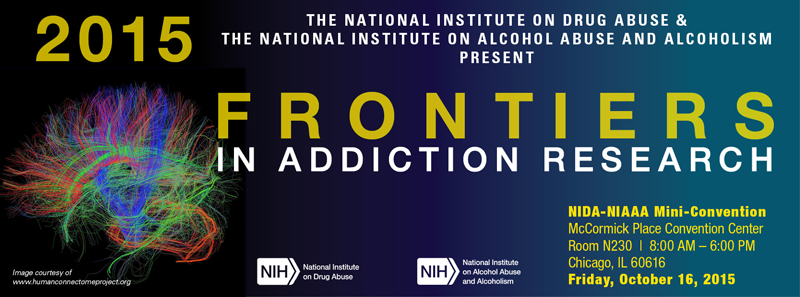
Draft Agenda
Please click here to download the draft agenda.
Frontiers in Addiction Research:
Neurobiological and Behavioral Consequences of Drug and Alcohol Use during Development
| Chairs: | Roger Sorensen, Ph.D., National Institute on Drug Abuse [NIDA]
Antonio Noronha, Ph.D., National Institute on Alcohol Abuse and Alcoholism [NIAAA] |
| 7:00 – 8:00 a.m. | Registration |
| 8:00 – 8:15 a.m. |
Introduction and Opening Remarks Nora Volkow, M.D. Director, NIDA George Koob, Ph.D. Director, NIAAA |
| 8:15 – 10:15 a.m. |
Session I: Brain Development, Structure, and Behavior This session will provide an overview of the maturation course of brain structure and the corresponding development of behavior. The speakers will present research findings that use various neuroimaging modalities and behavioral/cognitive tasks to show the dynamic structural and functional changes during the developmental transition from childhood through adolescence into early adulthood. Chairs: Steven Grant, Ph.D., NIDA Ellen Witt, Ph.D., NIAAA Speakers: Neuroimaging of Adolescent Brain Development: Challenges and Opportunities from NCANDA Adolf Pfefferbaum, M.D. SRI International Bio Abstract Contributions from the PING (Pediatric Imaging, Neurocognition, and Genetics) Study Terry Jernigan, Ph.D. University of California, San Diego Bio Abstract Risk and Resilience Predictors of Teenage Drug Use Hugh Garavan, Ph.D. University of Vermont Bio Abstract Adolescent-onset Alcohol and Marijuana Use: A Longitudinal Examination of Impacts on Brain Development and Behavior Monica Luciana, Ph.D. University of Minnesota Bio Abstract |
| 10:15 – 10:30 a.m. | --------BREAK----------- |
| 10:30 – 11:30 a.m. |
2015 Jacob P. Waletzky Memorial Award Lecture Dan Yong, Ph.D. Bio Abstract Established in 2003 by the Waletzky family, the Society for Neuroscience Jacob P. Waletzky Memorial Award is given to a young scientist (within 15 years of receiving a doctoral degree) for innovative research in substance abuse. NIDA and NIAAA are pleased to invite the 2015 awardee to present the keynote speech during the Mini-Convention. The previous recipients were Drs. Paul Phillips (2014), Rita Goldstein (2013), Andrew Holmes (2012), J. David Jentsch (2011), Paul Kenny (2010), Geoffrey Schoenbaum (2009), Christopher Pierce (2008), Marina Picciotto (2007), Yavin Shaham (2006), William Carlezon (2005), Antonello Bonci (2004), and Pier Vincenzo Piazza (2003). |
| 11:30 – 12:30 p.m. |
----------LUNCH ----------- (ON YOUR OWN) |
| 12:30 – 2:00 p.m. |
Session II: Genetics, Neurocognition and Behavioral Phenotypes This session will explore the genetics of human cognition and psychiatric disorders. Chairs: Roger Little, Ph.D., NIDA Changhai Cui, Ph.D., NIAAA Speakers: Neurocognitive Correlates of the Variance Common and Unique to Externalising Disorders and Substance Misuse in Adolescence (and the Efficacy of Interventions Targeting these Neurocognitive Profiles) Patricia Conrod, Ph.D. Centre de Recherche, CHU Ste Justine Bio Abstract Drug Use in the Philadelphia Neurodevelopmental Cohort Raquel E Gur, M.D., Ph.D. University of Pennsylvania Bio Abstract The Genotype-Tissue Expression (GTEx) Project Kristin Ardlie, Ph.D. Broad Institute Bio Abstract |
| 2:00 – 2:15 p.m. |
------------BREAK------------- |
| 2:15 – 4:45 p.m. |
Session III: Molecular, Cellular and Behavioral Underpinnings of Substance Use Disorder Vulnerability
Childhood and adolescence is a very vulnerable period of development. Youth by nature seek novelty and take risks that can affect their development and health. For example, research shows that the earlier in age that individuals experiment with alcohol or drugs, the more likely those individuals will be to develop a substance use disorder. Furthermore, evidence supports that neurobiological changes resulting from substance use in adolescence are longer-lasting as compare with substance use in adults. This session will explore the neurobiological and psychosocial processes underlying vulnerability and the development of substance abuse and addiction in adolescence. Chairs: Da-Yu Wu, Ph.D., NIDA Soundar Regunathan, Ph.D., NIAAA Speakers: Alcohol and Cell Adhesion: Rewiring the Brain Before Birth Michael Charness, M.D. Harvard Medical School Bio Abstract Contributors to and Consequences of Adolescent Alcohol Exposure: Studies in a Rodent Model Linda Spear, Ph.D. Binghamton University, SUNY Bio Abstract Long Lasting Changes in Adult Rat Brain in Models of Adolescent Alcohol Abuse Fulton Crews, Ph.D. University of North Carolina, Chapel Hill Bio Abstract Adolescent Alcohol and Epigenetic Modifications: An Emerging vulnerability factor for Adult Psychopathology Subhash C Pandey, Ph.D. University of Illinois, Chicago Bio Abstract Developmental Cannabis Exposure and the Protracted Effects On Brain and Behavior Yasmin Hurd, Ph.D. Icahn School of Medicine at Mount Sinai Bio Abstract |
| 4:45 – 5:00 p.m. |
Discussion and Wrap-up Nora Volkow, M.D. Director, NIDA George Koob, Ph.D. Director, NIAAA |
| 5:00 – 6:00 p.m. |
Joint NIDA-NIAAA Early Career Investigator Showcase [ECIS] The ECIS symposium provides a forum for scientific presentations by premier young and junior investigators working in the fields of substance abuse and addiction research. These scientific presentations further explore the neurobiological and behavioral consequences of drug and alcohol use during development. |
|
Chairs: Roger Sorensen, Ph.D., NIDA Antonio Noronha, Ph.D., NIAAA Speakers: [*10 minute presentations]
Functional Alterations in Resting State Connectivity in Rat Pups Following Postnatal Morphine Exposure
Ethanol Withdrawal Produces Hyperexcitability and Lowers Seizure Threshold in an Optogenetic Model of Seizure.
Opioid Ligands Differentially Affect Self-administration in Rats Raised in Different Rearing Environments During Adolescence
Brain Development in Heavy-Drinking Adolescents
Determining the Ontogeny of Working Memory and the Effects of Cannabinoid Self-administration in Adolescent Rats
Persistent Changes in the GluN2B-NMDA Receptor Proteome Following Chronic Adolescent Alcohol Exposure |
|
| 6:00 pm |
Adjournment |